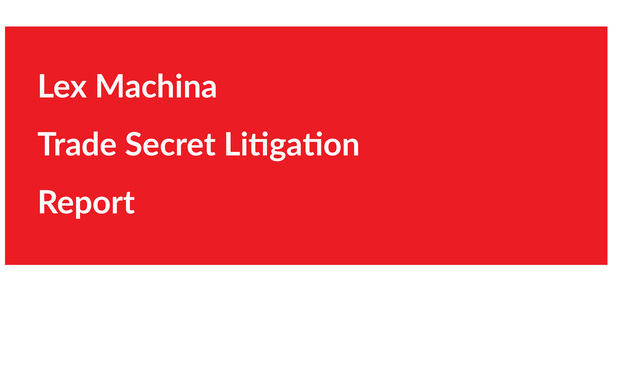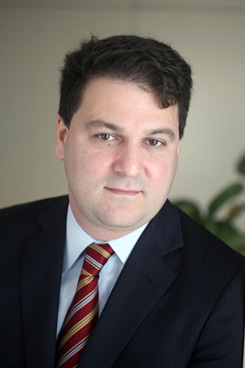Report: Trade Secret Litigation Cases Down but Damages Up in 2019
"The first way for a general counsel to use it is to validate their own choice of [outside] counsel," said Mark Klapow, a litigation partner and co-chair at Crowell & Moring in Washington, D.C. "You want someone who's been there before and really understands how to work these cases."
April 21, 2020 at 04:56 PM
5 minute read
The original version of this story was published on Corporate Counsel
 Photo: Courtesy Photo
Photo: Courtesy Photo
In 2019 federal courts awarded damages in fewer trade secret cases than in 2018 but a larger amount of money overall, according to a new report.
The Lex Machina 2020 Trade Secret Litigation Report, released Monday, features federal district court data from 2010 to 2019, with a focus on 2019. The report is especially useful for general counsel to spot trends, assess risk and strategize on trade secret litigation.
"The first way for a general counsel to use it is to validate their own choice of [outside] counsel," advised Mark Klapow, a litigation partner and co-chair at Crowell & Moring in Washington, D.C. Klapow spoke in a webinar Monday reviewing the report's findings.
 Mark Klapow of Crowell & Moring.
Mark Klapow of Crowell & Moring.He explained, "Protecting trade secrets and confidential information have become mission-critical for businesses, particularly in the technology ecosystem … As a general counsel, you want someone who's been there before and really understands how to work these cases."
The report shows the five most active plaintiffs law firms during the decade were Littler Mendelson; Ogletree, Deakins, Nash, Smoak & Stewart; Seyfarth Shaw; Jackson Lewis; and Fisher & Phillips. Looking at 2019 alone, the same five firms were on top, only Fisher & Phillips pushed up to No. 1 and Jackson Lewis to No. 2.
Klapow said because corporations can be the claimant and/or the defendant in a case, many of the law firms represent both sides. So it wasn't surprising that several of the top plaintiff firms also showed up on the top defendants' list of law firms.
Over the past decade, the top five defendant firms were Ogletree, Jackson Lewis, Littler, Foley & Lardner, and Greenberg Traurig. In 2019, Gordon Rees Scully Mansukhani moved to the top of that list.
Klapow noted that most of the active law firms are employment law specialists. "More than 50% of these cases are employee-driven," he said.
The report shows insurance and financial services companies are the most active plaintiffs of the decade. "Often these companies use a licensing or franchising system, then they sue for trade secret misappropriation when owners fail to pay the requisite fees or move to another company without returning the materials," it explains.
Klapow said the single most critical piece of information for both general counsel and outside counsel might be the report's analysis of jurisdictions, helping the lawyers decide which districts to file in, when there is a choice, and how to proceed after a judge has been assigned.
The key is to look at the grant/denial rates for injunctions and temporary restraining orders in each jurisdiction, Klapow explained, because most cases are resolved over that issue. "The grant/denial rates are dramatically different across jurisdictions," Klapow said, even though the standard for injunctive relief is similar.
He cited the Eastern District of Virginia where judges grant significantly fewer injunctions and restraining orders. He said observers think the judges in that district are so used to hearing major national security cases, which often involve tough decisions on granting injunctions, that they may not take the trade secret cases as seriously.
The report also shows a 30% increase in case filings since 2016, when the Defend Trade Secrets Act was passed. The law allows claimants to file directly in federal court when there is a connection between a trade secret and interstate or foreign commerce.
Districts with the most case filings tend to be located in major cities, noted Rachel Bailey, legal data expert for Lex Machina and author of the report. Bailey is based in New Orleans.
The most active districts over the past 10 years, for example, were the Central District of California in Los Angeles, the Northern District of Illinois in Chicago, the Southern District of New York in Manhattan and the Northern District of California in San Francisco. The Southern District of Texas, near Houston, pushed its way into the top five in 2019.
Klapow said he expects the Delaware district to be in the top five by the end of 2020. He added that trade secret cases are spread across the country, with the top five jurisdictions accounting for only 25% of all claims.
In other findings, the report shows:
- In 2019, courts awarded damages in fewer trade secret cases than in 2018 but a larger amount of money overall—$105 million in 2019 versus $71.9 million in 2018.
- The top plaintiff with 51 cases filed over 10 years was insurance giant Allstate Corp.
- In 2019 alone, the top filer was DiscoverOrg, a Vancouver, Washington, business database that brought 19 cases last year against people allegedly accessing its data without authorization.
- Over the decade, a large number of cases resolved with a consent judgment, which usually included a permanent injunction.
- Of terminated cases, 156 ended for failure to identify a trade secret; 116 were terminated for failure to maintain secrecy.
This content has been archived. It is available through our partners, LexisNexis® and Bloomberg Law.
To view this content, please continue to their sites.
Not a Lexis Subscriber?
Subscribe Now
Not a Bloomberg Law Subscriber?
Subscribe Now
NOT FOR REPRINT
© 2025 ALM Global, LLC, All Rights Reserved. Request academic re-use from www.copyright.com. All other uses, submit a request to [email protected]. For more information visit Asset & Logo Licensing.
You Might Like
View All
With DEI Rollbacks, Employment Lawyers See Potential For Targeting Corporate Commitment to Equality
7 minute read
MoFo Associate Sees a Familiar Face During Her First Appellate Argument: Justice Breyer

Amid the Tragedy of the L.A. Fires, a Lesson on the Value of Good Neighbors
Law Firms Mentioned
Trending Stories
- 1The Rise and Risks of Merchant Cash Advance Debt Relief Companies
- 2Ill. Class Action Claims Cannabis Companies Sell Products with Excessive THC Content
- 3Suboxone MDL Mostly Survives Initial Preemption Challenge
- 4Paul Hastings Hires Music Industry Practice Chair From Willkie in Los Angeles
- 5Global Software Firm Trying to Jump-Start Growth Hands CLO Post to 3-Time Legal Chief
Who Got The Work
J. Brugh Lower of Gibbons has entered an appearance for industrial equipment supplier Devco Corporation in a pending trademark infringement lawsuit. The suit, accusing the defendant of selling knock-off Graco products, was filed Dec. 18 in New Jersey District Court by Rivkin Radler on behalf of Graco Inc. and Graco Minnesota. The case, assigned to U.S. District Judge Zahid N. Quraishi, is 3:24-cv-11294, Graco Inc. et al v. Devco Corporation.
Who Got The Work
Rebecca Maller-Stein and Kent A. Yalowitz of Arnold & Porter Kaye Scholer have entered their appearances for Hanaco Venture Capital and its executives, Lior Prosor and David Frankel, in a pending securities lawsuit. The action, filed on Dec. 24 in New York Southern District Court by Zell, Aron & Co. on behalf of Goldeneye Advisors, accuses the defendants of negligently and fraudulently managing the plaintiff's $1 million investment. The case, assigned to U.S. District Judge Vernon S. Broderick, is 1:24-cv-09918, Goldeneye Advisors, LLC v. Hanaco Venture Capital, Ltd. et al.
Who Got The Work
Attorneys from A&O Shearman has stepped in as defense counsel for Toronto-Dominion Bank and other defendants in a pending securities class action. The suit, filed Dec. 11 in New York Southern District Court by Bleichmar Fonti & Auld, accuses the defendants of concealing the bank's 'pervasive' deficiencies in regards to its compliance with the Bank Secrecy Act and the quality of its anti-money laundering controls. The case, assigned to U.S. District Judge Arun Subramanian, is 1:24-cv-09445, Gonzalez v. The Toronto-Dominion Bank et al.
Who Got The Work
Crown Castle International, a Pennsylvania company providing shared communications infrastructure, has turned to Luke D. Wolf of Gordon Rees Scully Mansukhani to fend off a pending breach-of-contract lawsuit. The court action, filed Nov. 25 in Michigan Eastern District Court by Hooper Hathaway PC on behalf of The Town Residences LLC, accuses Crown Castle of failing to transfer approximately $30,000 in utility payments from T-Mobile in breach of a roof-top lease and assignment agreement. The case, assigned to U.S. District Judge Susan K. Declercq, is 2:24-cv-13131, The Town Residences LLC v. T-Mobile US, Inc. et al.
Who Got The Work
Wilfred P. Coronato and Daniel M. Schwartz of McCarter & English have stepped in as defense counsel to Electrolux Home Products Inc. in a pending product liability lawsuit. The court action, filed Nov. 26 in New York Eastern District Court by Poulos Lopiccolo PC and Nagel Rice LLP on behalf of David Stern, alleges that the defendant's refrigerators’ drawers and shelving repeatedly break and fall apart within months after purchase. The case, assigned to U.S. District Judge Joan M. Azrack, is 2:24-cv-08204, Stern v. Electrolux Home Products, Inc.
Featured Firms
Law Offices of Gary Martin Hays & Associates, P.C.
(470) 294-1674
Law Offices of Mark E. Salomone
(857) 444-6468
Smith & Hassler
(713) 739-1250







